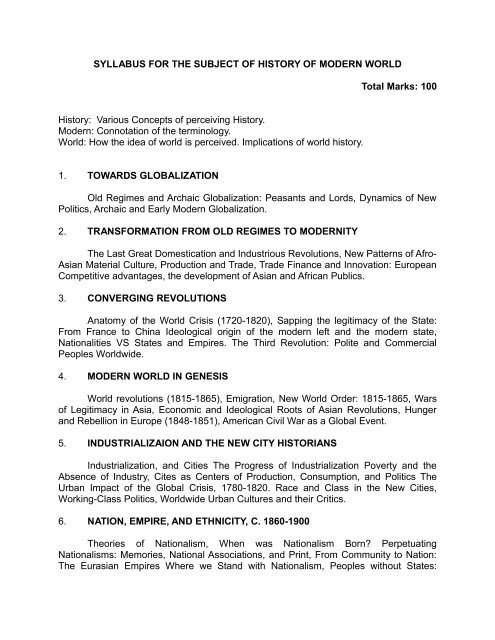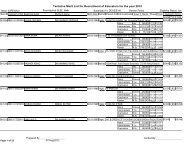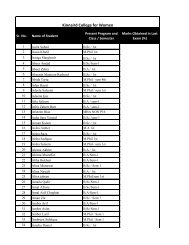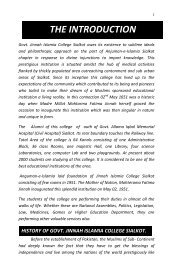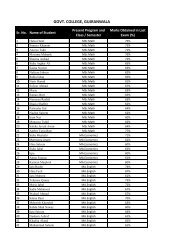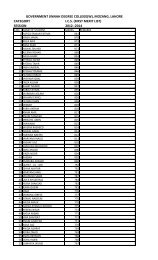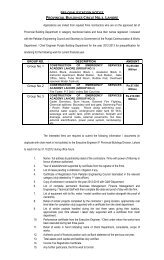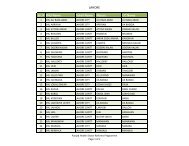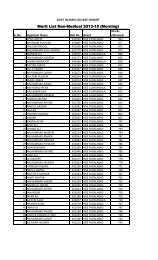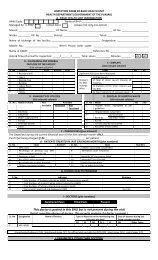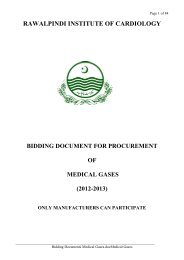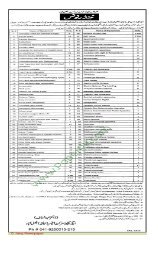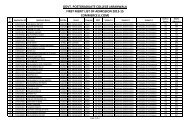SYLLABUS FOR THE SUBJECT OF HISTORY OF MODERN WORLDTotal Marks: 100History: Various Concepts <strong>of</strong> perceiving History.Modern: Connotation <strong>of</strong> <strong>the</strong> terminology.World: How <strong>the</strong> idea <strong>of</strong> world is perceived. Implications <strong>of</strong> world history.1. TOWARDS GLOBALIZATIONOld Regimes and Archaic Globalization: Peasants and Lords, Dynamics <strong>of</strong> NewPolitics, Archaic and Early Modern Globalization.2. TRANSFORMATION FROM OLD REGIMES TO MODERNITYThe Last Great Domestication and Industrious Revolutions, New Patterns <strong>of</strong> Afro-Asian Material Culture, Production and Trade, Trade Finance and Innovation: EuropeanCompetitive advantages, <strong>the</strong> development <strong>of</strong> Asian and African <strong>Public</strong>s.3. CONVERGING REVOLUTIONSAnatomy <strong>of</strong> <strong>the</strong> World Crisis (1720-1820), Sapping <strong>the</strong> legitimacy <strong>of</strong> <strong>the</strong> State:From France to China Ideological origin <strong>of</strong> <strong>the</strong> modern left and <strong>the</strong> modern state,Nationalities VS States and Empires. The Third Revolution: Polite and CommercialPeoples Worldwide.4. MODERN WORLD IN GENESISWorld revolutions (1815-1865), Emigration, New World Order: 1815-1865, Wars<strong>of</strong> Legitimacy in Asia, Economic and Ideological Roots <strong>of</strong> Asian Revolutions, Hungerand Rebellion in Europe (1848-1851), American Civil War as a Global Event.5. INDUSTRIALIZAION AND THE NEW CITY HISTORIANSIndustrialization, and Cities The Progress <strong>of</strong> Industrialization Poverty and <strong>the</strong>Absence <strong>of</strong> Industry, Cites as Centers <strong>of</strong> Production, Consumption, and Politics TheUrban Impact <strong>of</strong> <strong>the</strong> Global Crisis, 1780-1820. Race and Class in <strong>the</strong> New Cities,Working-Class Politics, Worldwide Urban Cultures and <strong>the</strong>ir Critics.6. NATION, EMPIRE, AND ETHNICITY, C. 1860-1900Theories <strong>of</strong> Nationalism, When was Nationalism Born? PerpetuatingNationalisms: Memories, National Associations, and Print, From Community to Nation:The Eurasian Empires Where we Stand with Nationalism, Peoples without States:
Persecution or Assimilation? Imperialism and its History: The Late Nineteenth CenturyDimensions <strong>of</strong> <strong>the</strong> “New Imperialism”. A World <strong>of</strong> Nation-States? The Persistence <strong>of</strong>Archaic Globalization From Globalization to Internationalism in Practice.7. MYTHS AND TECHNOLOGIES OF THE MODERN STATE DIMENSIONS OFTHE MODERN STATEThe State and <strong>the</strong> Historians, Problems <strong>of</strong> Defining <strong>the</strong> State, The Modern StateTakes Root: Geographical Dimensions Claims to Justice and Symbols <strong>of</strong> Power, TheState’s Resources, The State’s Obligations to Society Tools <strong>of</strong> <strong>the</strong> State, State,Economy, and Nation.8. THE THEORY AND PRACTICE OF LIBERALISM, RATIONALISM,SOCIALISM, AND SCIENCEContextualizing Intellectual History, The Corruption <strong>of</strong> <strong>the</strong> Righteous Republic: AClassic Theme. Righteous Republics Worldwide, The Advent <strong>of</strong> Liberalism and <strong>the</strong>Market: Western Exceptionalism? Liberalism and Land Re<strong>for</strong>m: Radical Theory andConservative Practice, Free Trade or National Political Economy? Representing <strong>the</strong>Peoples Secularism and Positivism: Transnational Affinites The Reception <strong>of</strong> Socialismand its Local Resonances. Science in Global Context. Pr<strong>of</strong>essionalization at WorldLevel.9. SOCIAL AND INTELLECTUAL MOVEMENTSRevolutionary Ideas, Philosophical and social trends.10. Clash <strong>of</strong> Civilizations11. Neo-ConservationRECOMMENDED TEXTS AND LITERATURE REVIEWS23. Dorinda Outram, The Body and <strong>the</strong> French Revolution24. Frenc Feher, French revolution and <strong>the</strong> Birth <strong>of</strong> Modernity25. H Kissinger, Diplomacy26. J M Thompson, Napoleon Bonaparte: His Rise and Fall27. E J Hobsbawn, The Age <strong>of</strong> revolution, 1789-184828. E J Hobsbawn, Nations and Nationalism since 1780: Programme, Myth,Reality29. P Pilbeam, The 1830 Revolution in France30. Paul Kennedy, The Rise and Fall <strong>of</strong> Great Powers31. Owen Chadwick, The Secularization <strong>of</strong> European Mind in <strong>the</strong> NineteenthCentury (1976)
- Page 4 and 5:
ANIMAL HUSBANDRYPAPER-IITotal Marks
- Page 6 and 7:
SYLLABUS FOR THE SUBJECT OF AGRICUL
- Page 8 and 9:
29. Taiz and Zager. 2003. Plant Phy
- Page 10 and 11:
SUGGESTED READINGS1. Agrios, G.N. 1
- Page 13 and 14:
SYLLABUS FOR THE SUBJECT OF ARABICP
- Page 15 and 16:
PAPER-IITotal Marks:100POETRY1. Mau
- Page 17 and 18:
RECOMMENDED BOOKS1. Harold C. Bold
- Page 19 and 20:
6. Gardner, E.J., Simmons, M. J. an
- Page 21 and 22:
Total Marks: 100Part-IMARKETINGMark
- Page 23 and 24:
SYLLABUS FOR THE SUBJECT OF CHEMIST
- Page 25 and 26:
(A)Organic ChemistryPAPER-IITOTAL M
- Page 27 and 28:
SYLLABUS FOR THE SUBJECT OF COMPUTE
- Page 29 and 30:
REFERENCE MATERIAL:1. Database Syst
- Page 31 and 32:
REFERENCE MATERIAL:1. Elements of N
- Page 33 and 34:
3. Siberschatz. Galvin & Gagne, Ope
- Page 35 and 36:
Imperfectly competitive market stru
- Page 37 and 38:
PAPER - IIMACROECONOMICSTotal Marks
- Page 39 and 40:
SYLLABUS FOR THE SUBJECT OF EDUCATI
- Page 41 and 42:
1. Philosophy of EducationPAPER- II
- Page 43 and 44:
5.4.5 Leadership in the Evaluation
- Page 45 and 46:
9. Maya Angelou: Women Work10. Robe
- Page 47:
3. Charles Lamb: Chimney Sweeper4.
- Page 51 and 52:
8. Advertising: Definition-Merits a
- Page 53 and 54:
Recommended Books:1. Anton, H, Calc
- Page 55 and 56:
Recommended Books:1. Nicholson. W.K
- Page 57 and 58:
D. History of Persian Literature in
- Page 59 and 60:
Total Marks: 100Muslim Philosophy1.
- Page 61 and 62:
Course Outline:1. The Universe:-SYL
- Page 63 and 64:
22.Mcliveen, J.F.R. (1991) “Funda
- Page 65 and 66:
BOOKS:-Various types of agriculture
- Page 67 and 68:
3. Debliji, H.J.D2005 “Concepts a
- Page 69 and 70:
Paper - llTotal Marks -100Electrici
- Page 71 and 72:
MechanicsSYLLABUS FOR THE SUBJECT O
- Page 73 and 74:
SUGGESTED READINGS1. Perspectives o
- Page 75 and 76: COMPARATIVE POLITICSPAPER - II Tota
- Page 77 and 78: SYLLABUS FOR THE SUBJECT OF PRINCIP
- Page 79 and 80: Amplifier & Oscillators: Working an
- Page 81 and 82: 6. Civil Engineering Fundamentals:S
- Page 83 and 84: SYLLABUS FOR THE SUBJECT OF PSYCHOL
- Page 85 and 86: PAPER-IITotal Marks: 100I. Health,
- Page 87 and 88: SYLLABUS FOR THE SUBJECT OF PUBLIC
- Page 89 and 90: Total Marks: 1001 - Organizational
- Page 91 and 92: 19. Government and Administration i
- Page 93 and 94: 6. Social Problems of Pakistana) Ma
- Page 95 and 96: iii. Community DevelopmentSECONDARY
- Page 97 and 98: SYLLABUS FOR THE SUBJECT OF SOCIAL
- Page 99 and 100: Paper - IITotal Marks: 1001. Nature
- Page 101 and 102: 5. Role of Voluntary Social Welfare
- Page 103 and 104: iv.Gender Stratificationa. Working
- Page 105 and 106: c. The assumptions and activities o
- Page 107 and 108: 3. Society and the environment: the
- Page 109 and 110: PAPER-IIAPPLIED SOCIOLOGYTotal Mark
- Page 111 and 112: 2. GLOBALIZATION AND SOCIAL CHANGE1
- Page 113 and 114: 3. Patterns of crime in Pakistani.
- Page 115 and 116: SYLLABUS FOR THE SUBJECT OF STATIST
- Page 117 and 118: PAPER- BSampling and Sampling Distr
- Page 119 and 120: BOOKS RECOMMENDED:1. Clark, G.M. an
- Page 121 and 122: Echinodermata:Skeletion, Water vasc
- Page 123 and 124: PAPER -IIGeneral ZoologyTotal Marks
- Page 125: 16. Gagong, W.F. 1987, Prentice Hal
- Page 129 and 130: HISTORY OF SOUTH ASIAFrom Pre-histo
- Page 131: 24.Farhat Mahmud, Pak-US Relations2
- Page 134 and 135: Paper IITotal Marks: 100Earth Resou
- Page 136 and 137: SYLLABUS FOR THE SUBJECT OF COMMERC


